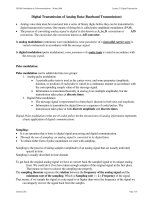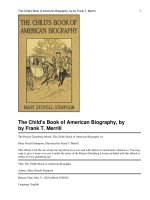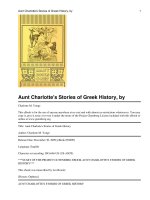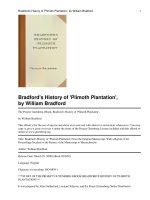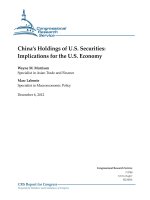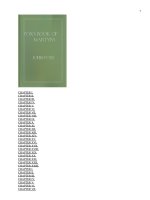Lecture Literary criticism - Lecture 22: Coleridge’s concept of poetry
Bạn đang xem bản rút gọn của tài liệu. Xem và tải ngay bản đầy đủ của tài liệu tại đây (134.32 KB, 20 trang )
COLERIDGE’S CONCEPT OF
POETRY
• Coleridge does not give his clear cut conception of
Poetry but we have ascertained from his Biographia
Literia
• For Wordsworth the vitalityof the poet’s perception
seemed to guarantee both its own justness and
liveliness, and the whole from content problem is left
in the air.In attempting to remedy this defect in
Wordsworth argument.Coleridge puts the
philosophical inquiry into the nature and value of
poetry on an entirely new footing.
• Unfortunately never summed up his view of the
nature and value of poetry in a brief and cogent
essay.The nearest we can get to a single shot essay
summing up his view of poetry is the famous
fourteenth chapter of his Biographia Literaria and
somewhat cryptic paragraph on the imagination in
chapter thirteenth.we can study his conception of
poetry under three headings
• Definition and function of poetry
• Poetry for coleridge is a wider category than that of a
poem I.e.poetry is a kind of activity which can be
engaged in by painters or philosophers or scientists
and is not confined to those who employ metrical
language or even to those who employ language of
any kind
• Poetry in this largest sense brings the whole soul of
men into activity with each faculty playing its proper
part according to its relative worth and
dignity.Coleridge defines through the exercise of his
imagination.
• Poetry in its largest sense is the regulative idea of all
the fine arts and in its narrow sense it may be caled a
poem ”it is the excitement of emotions for the
purpose of immediate pleasure through the medium
of beauty”
• (a) Excitement of Emotions: Like all the romantic
poets and critics coleridge stresses the necessity if
feelings or emotions or passion but it is the minds of
the poets that he is here speaking of .The essential
thing in poetry is that the poet is here to arouse the
emotions in others. So art for coleridge does not exist
to satisfy the creative impulse of the artist but tu
communicate his state of mind to others .Poetry
should strike the reader as a wording of his own
highest thoughts .
• (b) Immediate Pleasure: Here pleasure is contrasted
with truth which is the object of science and it is
immediate because it is derived from the experience
solely and for its own sake and it is what we should
call a disinterested pleasure.It does not arouse
pleasure by reason of some other satisfaction that
might be implied
• The pleasurable experience derived from a work of
art is its own intrinsic pleasure and none other .It may
as scott james explains happens to be useful
,moral,instructive , health giving but it is not for these
results that it is pursued or for any results other than
the pleasure arising directly from it.
• (c) Through the medium of poetry: It is not enough to
set up pleasure as the purpose it is pleasure arising
through the medium of beauty .Kings please us
because they are beautiful.This satisfaction is of a
specific kind and is possible to all though coleridge
seems to hold that it can only be experienced fully by
men of much sensibility ,whose faculties have been
trained to appreciate the beautiful when they see it
• So coleridge,s definition of art is not complete until
he has given us his definition of beauty. According to
him in unity lies the essence of beautiful;the sense of
beauty subsists in simultaneous intuition of the
relation of parts ,each to each and of all to a whole
Difference between Prose and
Poetry
• Coleridge describes that a poem contains same
element as prose composition ,the difference must be
there in the combination in consequence of a
different object being proposed.Both prose and
poetry use words the difference then of course
cannot lie in the medium
• A poet combines words differently because it is
seekin to do something rhymed and metrical
compositions are easy to remember.Rhyme yields a
particular pleasure to though not of a very high
order.But it must be kept in mind that rhyme and
metre do not arise from the nature of the content .So
this is not very profound either
• Coleridge further describes that difference of object
and contents supplies initial grounds of
distinction.The philosopher will seek to differentiate
between the two ways of handling language by
asking what each seeks to achieve and how that aim
determine its nature .
• The immediate purpose may be the communication
of truth or the communication of pleasure.The
communication of truth might in turn yield a deep
pleasure but coleridge insists one must distinguish
between the ultimate and immediate end, the proper
kind of distinction between different kinds of writing
can thus be the most logically discussed in terms of
difference in the immediate aim or function of each
the immediate aim of poetry is to give pleasure that of
prose to give truth
Qualities in a Poem
• In biographia literaria coleridge discusses practical
criticism here he seeks to discover the traits of poetry
which may be deemed promising and specific
symptoms of poetic power he examines four good
qualities that are important for all good poems
• (a) The Perfect sweetness of Versification.The first
quality that he points out is perfect sweetness of
versification the sense of musical delight with the
power of producing it is either born ion man or never
appears it cannot be acquired
• (b) No Private interest in the choice of subjects. The
second promise of genius is in the choice of subject
very remote from the private interest and
circumstances of the writer the readers attention is all
the more engaged by the utter aloofness of the poets
own feeling from those of which he is at one the
painter and the analyst
• The point made by coleridge is twofold there should
be detachment and disinterestedness first in the
choice of subject matter second in the treatment of
it.It is of the essence of artistic creation to be able to
extend the range of human interest beyond those
things which the individual has personal experience
• ( c) Energy of Thought:Third characteristic which
coleridge discusses is depth and energy of
thought.No man was ever yet a great poet without
being at the same time a profound philosopher it
does not mean the the purpose of poetry is to
expound intellectual views of shakespeare he writes
that he first studied patiently ,meditatded
deeply,understood minutely till knowledge became
habitual and intuitive
• (d) A Predominant Passion: Images however
beautiful fatefully copied from nature do not of
themselves characterize the poet they become proofs
original genius only as far as they are modified by a
predominant passion or by associated thought s or
images awakened by that passion or when they have
the effect of reducing multitude to unity or succession
to an instant or lastly when ahuamn and intellectual lif
eis transferred to them from the poets own spirit
which shoots iys being through earth sea and air

